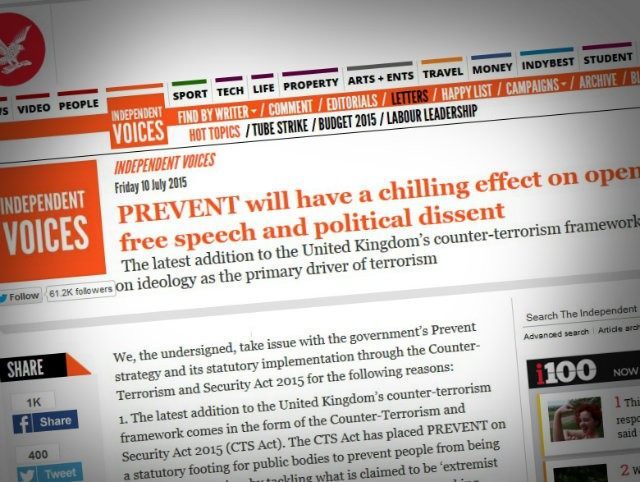An open letter published in this morning’s Independent calling for the government to abandon its PREVENT counter-terror strategy has been signed by 280 individuals including known Islamists and terror sympathizers.
The letter argues that terrorism is a “social, economic and political” issue and that “dialogue,” rather than “fixating” on ideology, is the correct response. It claims PREVENT will harm free speech, lead to Muslims who grow beards being labelled “potential terrorists” and could even be used against anti-austerity and environmental campaigners.
Signatures include Haitham Al Haddad, a members of Hizb ut-Tahrir and the Sharia Council of Britain who believes apostates should be killed and supports FGM; Asim Quresi of CAGE, who called Jihadi John “a beautiful man;” and Shakeel Begg, a hardline Imam from a mosque where the killers of Lee Rigby worshipped.
The Government’s counter-radicalisation strategy, PREVENT was introduced after 9/11, however new powers were brought into effect this month under the Counter-Terrorism and Security Act (CST Act), which require teachers, social workers, prison officers and NHS managers to report signs of radicalisation. People thought to be embracing extremism will be sent on deradicalisation programmes.
The letter argues that “[t]he way PREVENT conceptualises ‘radicalisation’ and ‘extremism’ is based on the unsubstantiated view that religious ideology is the primary driving factor for terrorism,” and claims that, “Academic research suggests that social, economic and political factors, as well as social exclusion, play a more central role in driving political violence than ideology.
“This serves to reinforce a prejudicial worldview that perceives Islam to be a retrograde and oppressive religion that threatens the West.”
Because PREVENT is “fixated” on religion, “growing a beard, wearing a hijab or mixing with those who believe Islam has a comprehensive political philosophy are key markers used to identify ‘potential’ terrorism,” it says, adding: “While much of the PREVENT policy is aimed at those suspected of ‘Islamist extremism’ and far-right activity, there is genuine concern that other groups will also be affected by such policies, such as anti-austerity and environmental campaigners – largely those engaged in political dissent.”
The most reasonable point made in the letter is regarding free speech: “PREVENT will have a chilling effect on open debate, free speech and political dissent. It will create an environment in which political change can no longer be discussed openly,” it argues. It has been pointed out, however, that it is hard to take this argument seriously from signatures who reject freedom and democracy as part of their world view.
“We call on the government to end its ineffective PREVENT policy and rather adopt an approach that is based on dialogue and openness,” the letter concludes.
A Home Office spokesperson told the The Independent: “Protecting those who are vulnerable and at risk of radicalisation is both complex and vitally important, which is why it is disappointing to see simplistic claims that are at best inaccurate and at worst scaremongering.”
They added: “… It is simplistic and wrong to claim Prevent focuses ‘on religious interaction and Islamic symbolism to assess radicalisation’. There is no single cause of radicalisation. The Channel programme, a part of Prevent, assesses the vulnerability of those referred to it using a comprehensive system of 22 different factors and guidance is explicit that ‘outward expression of faith, in the absence of any other indicator of vulnerability, is not a reason to make a referral to Channel’.”

COMMENTS
Please let us know if you're having issues with commenting.